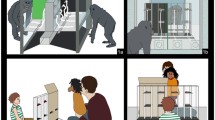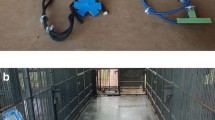Abstract
Humans employ various strategies, including selfish and altruistic strategies, depending on the situation. In order to examine whether non-human animals show such flexibility or not, we analyzed chimpanzees’ selfish and cooperative behavior in two types of social problem situations. In this study, we tested chimpanzee mother–infant pairs in two adjacent booths, each equipped with a vending machine. When a token was inserted into a vending machine, the vending machine delivered food rewards to the adjacent booth. In experiment 1, a partition between the two booths was open. In experiment 2, the partition was closed and a mother and her infant were placed in separate booths, so that reciprocal cooperation was essential for them to receive rewards. The participants did not cooperate reciprocally in either experiment. In experiment 1, the chimpanzees developed selfish tactics to get rewards and changed their tactics flexibly according to the partner’s behaviors. In experiment 2, in which they could not receive rewards without cooperation, they stopped altogether inserting tokens. In both cases, the infants stopped cooperating first. These findings support the idea that chimpanzees are primarily competitive rather than cooperative. Chimpanzees’ high social intelligence might be demonstrated in the flexibility of their selfish tactics, but not in the form of reciprocal cooperation at least when food is involved. We suggest that the failure to establish reciprocal cooperation was due to the social relationship between the mother and her infant, which was characterized by infant’s privilege and mother’s tolerance.




Similar content being viewed by others
References
Boesch C, Boesch H (1989) Hunting behavior of wild chimpanzees in the Tai National Park. Am J Phys Anthropol 78:547–573
Brosnan S, Schiff HC, de Waal FBM (2005) Tolerance for inequity may increase with social closeness in chimpanzees. Proc Roy Soc B 272:253–258
Byrne RW, Whiten A (1988) Machiavellian intelligence. Social expertise and the evolution of intellect in monkeys, apes, and humans. Oxford University Press, New York
Call J, Agnetta B, Tomasello M (2000) Social cues that chimpanzees do and do not use to find hidden objects. Anim Cogn 3:23–34
Chapais B (2006) Kinship, competence and cooperation in primates. In: Kappeler PM, van Schaik CP (eds) Cooperation in primates and humans. Springer, Berlin, pp 47–64
de Waal FBM (1997) The chimpanzee’s service economy: food for grooming. Evol Hum Behav 18:375–386
de Waal FBM, Berger ML (2000) Payment for labour in monkeys. Nature 404:563
Dugatkin LA (1997) Cooperation among animals: an evolutionary perspective. Oxford University Press, Oxford
Goodall J (1986) The chimpanzees of Gombe: patterns of behavior. Harvard University Press, Cambridge
Hammerstein P (2003) Why is reciprocity so rare in social animals? A protestant appeal. In: Hammerstein P (ed) Genetic and cultural evolution of cooperation. MIT Press, Cambridge, pp 83–94
Hare B (2001) Can competitive paradigms increase the validity of experiments on primate social cognition? Anim Cogn 4:269–280
Hare B, Tomasello M (2004) Chimpanzees are more skilful in competitive than in cooperative cognitive tasks. Anim Behav 68:571–581
Hare B, Call J, Agnetta B, Tomasello M (2000) Chimpanzees know what conspecifics do and do not see. Anim Behav 59:771–785
Hare B, Call J, Tomasello M (2001) Do chimpanzees know what conspecifics know? Anim Behav 61:139–151
Hare B, Call J, Tomasello M (2006) Chimpanzees deceive a human competitor by hiding. Cognition 101:495–514
Hare B, Melis A, Woods V, Hastings S, Wrangham R (2007) Tolerance allows bonobos to outperform chimpanzees in a cooperative task. Curr Biol 17:619–623
Hauser MD, Chen K, Chen F, Chuang E (2003) Give unto others: genetically unrelated cotton-top tamarin monkeys preferentially give food to those who give food back. Proc Roy Soc London Ser B 270:2363–2370
Hikami K, Matsuzawa T (1991) Lever pressing of two chimpanzees in a competitive/cooperative situation. Primate Res 7:12–22 (in Japanese with English abstract)
Hirata S, Fuwa K (2007) Chimpanzees (Pan troglodytes) learn to act with other individuals in a cooperative task. Primates 48:13–21
Hirata S, Matsuzawa T (2001) Tactics to obtain a hidden food item in chimpanzee pairs (Pan troglodytes). Anim Cogn 4:285–295
Itani J (1954) Japanese monkeys in Takasakiyama. In: Imanishi K (ed) Nihon Dobutsuki. Kobunsha, Tokyo (in Japanese)
Jensen K, Hare B, Call J, Tomasello M (2006) What’s in it for me? Self-regard precludes altruism and spite in chimpanzees. Proc Roy Soc London Ser B 273:1013–1021
Jensen K, Call J, Tomasello M (2007a) Chimpanzees are rational maximizers in an Ultimatum Game. Science 318:107–109
Jensen K, Call J, Tomasello M (2007b) Chimpanzees are vengeful but not spiteful. Proc Natl Acad Sci USA 104:13046–13050
Kappeler PM, van Schaik CP (eds.) (2006) Cooperation in primates and humans: Mechanisms and evolution. Springer, Berlin
Matsuzawa T (2009) Chimpanzee mind: looking for the evolutionary roots of the human mind. Anim Cogn. doi:10.1007/s10071-009-0277-1
Matsuzawa T, Biro D, Humle T, Inoue-Nakamura N, Tonooka R, Yamakoshi G (2001) Emergence of culture in wild chimpanzees: education by master-apprenticeship. In: Matsuzawa T (ed) Primate origins of human cognition and behavior. Springer, Tokyo, pp 557–574
Matsuzawa T, Tomonaga M, Tanaka M (eds) (2006) Cognitive development of chimpanzees. Springer, Tokyo
Melis A, Hare B, Tomasello M (2006a) Chimpanzees recruit the best collaborators. Science 311:1297–1300
Melis A, Hare B, Tomasello M (2006b) Engineering cooperation in chimpanzees: tolerance constraints on cooperation. Anim Behav 72:275–286
Mitani JC, Watts DP (2001) Why do chimpanzees hunt and share meat? Anim Behav 61:915–924
Mowrer OH (1940) Animal studies in the genesis of personality. Trans NY Acad Sci 3:8–11
Oldfield-Box H (1967) Social organization of rats in a “Social Problem” situation. Nature 213:533–534
Povinelli DJ, Bierschwale DT, Cech CG (1999) Comprehension of seeing as a referential act in young children, but not juvenile chimpanzees. Br J Dev Psych 17:37–60
Pruitt DG, Kimmel MJ (1977) Twenty years of experimental gaming: critique, synthesis, and suggestions for the future. Ann Rev Psychol 28:363–392
Silk JB, Brosnan SF, Vonk J, Henrich J, Povinelli DJ, Richardson AS, Lambeth SP, Mascaro J, Schapiro SJ (2005) Chimpanzees are indifferent to the welfare of unrelated group members. Nature 27:1357–1359
Sousa C, Matsuzawa T (2001) The use of tokens as rewards and tools by chimpanzees (Pan troglodytes). Anim Cogn 4:213–221
Sousa C, Okamoto S, Matsuzawa T (2003) Behavioural development in a matching-to-sample task and token use by an infant chimpanzee reared by his mother. Anim Cogn 6:259–267
Stevens JR, Hauser MD (2004) Why be nice? Psychological constraints on the evolution of cooperation. Trends Cogn Sci 8:60–65
Tanaka M, Yamamoto S (2009) Token transfer between mother and offspring chimpanzees (Pan troglodytes): mother–offspring interaction in a competitive situation. Anim Cogn. doi:10.1007/s10071-009-0270-8
Tomasello M, Call J, Gluckman A (1997) Comprehension of novel communicative signs by apes and human children. Child Dev 68:1067–1080
Trivers RL (1971) The evolution of reciprocal altruism. Q Rev Biol 46:35–57
Ueno A, Matsuzawa T (2004) Food transfer between chimpanzee mothers and their infants. Primates 45:231–239
Vonk J, Brosnan SF, Silk JB, Henrich J, Richardson AS, Lambeth SP, Schapiro SJ, Povinelli DJ (2008) Chimpanzees do not take advantage of very low cost opportunities to deliver food to unrelated group members. Anim Behav 75:1757–1770
Warneken F, Tomasello M (2006) Altruistic helping in human infants and young chimpanzees. Science 311:1301–1303
Warneken F, Hare B, Melis AP, Hanus D, Tomasello M (2007) Spontaneous altruism by chimpanzees and young children. PLoS Biol 5(7):e184. doi:10.1371/journal.pbio.0050184
Whiten A, Byrne RW (1997) Machiavellian intelligence II. Extensions and evaluations. Cambridge University Press, New York
Yamamoto S, Tanaka M (2009a) How did altruism and reciprocity evolve in humans? Perspectives from experiments on chimpanzees (Pan troglodytes). Interact Stud 10:150–182
Yamamoto S, Tanaka M (2009b) Do chimpanzees (Pan troglodytes) spontaneously take turns in a reciprocal cooperation task? J Comp Psychol (in press)
Acknowledgments
The present study was financially supported by a grant (#16002001 and # 20002001 to T. Matsuzawa) from the Ministry of Education, Culture, Sports and Technology (MEXT), Japan, by the Global COE Program of MEXT (A06 and D07 to Kyoto University), and by a grant from the Japan Society for the Promotion of Science for Young Scientists (#18-3451 to S. Yamamoto). We thank Prof. T. Matsuzawa, Dr. M. Tomonaga, Dr. T. Humle, and other colleagues in the Section of Language and Intelligence, the Primate Research Institute of Kyoto University (KUPRI) for their support and helpful comments on the present study. We also thank the staff members of the Center for Human Evolution Modeling Research in KUPRI, for veterinary and daily care of the chimpanzees.
Author information
Authors and Affiliations
Corresponding author
Additional information
This contribution is part of the Supplement Issue “The Chimpanzee Mind” (Matsuzawa 2009).
Electronic supplementary material
Below is the link to the electronic supplementary material.
S1 Token-passing between a mother (Ai, left)-infant (Ayumu, right) pair in session 22 of experiment 1. The infant was supplied with a token, and gave it to his mother. The mother gave it back to her infant. Then the infant tried to give it to his mother again whilst vocalizing. Finally the mother received it and inserted it, which resulted in the delivery of a reward to the infant. (WMV 507 kb)
S2 Parasitic behavior by the mother (Pan). The infant Pal inserted a token into a vending machine in front of her mother Pan, who was lying down on the floor, and a reward was delivered to the next booth (right side). Then the mother moved quickly to the next booth ahead of her infant, and got the reward. (WMV 1459 kb)
Rights and permissions
About this article
Cite this article
Yamamoto, S., Tanaka, M. Selfish strategies develop in social problem situations in chimpanzee (Pan troglodytes) mother–infant pairs. Anim Cogn 12 (Suppl 1), 27–36 (2009). https://doi.org/10.1007/s10071-009-0276-2
Received:
Revised:
Accepted:
Published:
Issue Date:
DOI: https://doi.org/10.1007/s10071-009-0276-2




